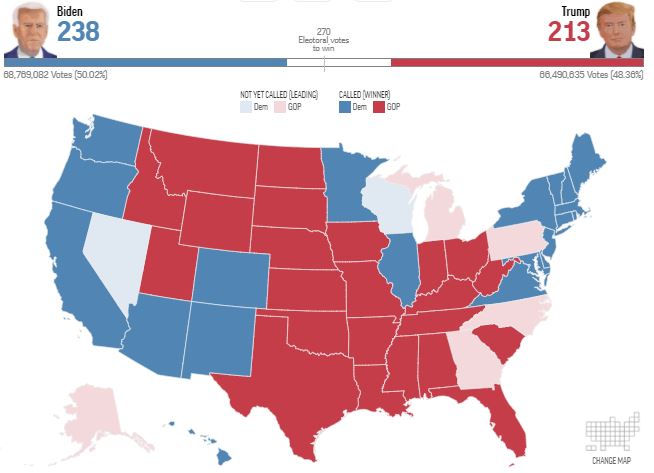Blue Wave Crashes
It'll be days before we know the final 2020 results but a resounding repudiation is unlikely.
Yesterday morning, we were told that the Associated Press was the news outlet to pay closest attention to for election results, because they had reporters down at the district level, worked closely with election officials, and did not call states prematurely because of ratings pressures. Here’s where they are as of 6am:

President Trump has already, as many of us feared, prematurely claimed victory. Joe Biden is actually likely to win, given that the outstanding votes are in heavily-Democratic urban areas and the early voting that Trump conditioned his supporters to think was fraudulent.
Still, the blue wave that some of us predicted did not materialize. While there was still some hope for it when I turned in five hours ago, the AP has now called Florida and Texas for Trump. Moreover, it’s looking like his party will hold on to the Senate.
Thus, 12 hours after the polls closed on most of the East Coast, the election looks much like it did a year ago. As the AP headline has it, the “Presidency hinges on tight races in battleground states.” When does it not?
The fate of the United States presidency hung in the balance Wednesday morning, as President Donald Trump and Democratic challenger Joe Biden battled for three familiar battleground states — Wisconsin, Michigan and Pennsylvania — that could prove crucial in determining who wins the White House.
A late burst of votes in Wisconsin from Milwaukee gave Biden a small lead, but it was too early to call the race. Hundreds of thousands of votes were also outstanding in Michigan and Pennsylvania.
As with the CNN telecast last evening, I don’t like how this is being framed. There was no “late burst of votes in Wisconsin” nor are “hundreds of thousands of votes outstanding.” The votes were cast on time. It’s the counting of them that’s happening disproportionately more slowly in heavily populated areas. Reporting it this way plays into Trump’s hands.
The two candidates, who have proposed dramatically different visions for the nation, split territory across the U.S. after polls closed Tuesday night. With neither candidate securing the 270 Electoral College votes needed to win the White House, Biden urged patience and vowed that every vote would be counted.
But Trump, in an extraordinary move from the White House, called for outstanding ballots not to be counted.
Trump made premature claims of victories in several key states and said he would take the election to the Supreme Court to stop the counting. It was unclear exactly what legal action he might try to pursue.
Vote tabulations routinely continue beyond Election Day, and states largely set the rules for when the count has to end. In presidential elections, a key point is the date in December when presidential electors met. That’s set by federal law.
All of the reputable outlets seem to be following the same path: declaring Trump’s declaration false. While Fox News has been more subdued on that front, it’s worth noting that they have the same electoral vote tally as the AP and were the first of the major outlets to call Arizona for Biden. Indeed, their headline is quite banal: “No clear winner in presidential race as vote counting continues, election hangs in balance.”And their coverage of the claim is perfectly reasonable:
Trump declared victory in multiple key battleground states early Wednesday, even though it remained unclear who had the votes to win and hinted the White House would push the Supreme Court to rule over disputed ballots.
“We’ll be going to the U.S. Supreme Court,” Trump said.
The president was immediately contradicted by Vice President Mike Pence, who did not declare victory but rather said, “I really believe with all my heart … that we are on the road to victory and we will make America great again, again.”
Interestingly, OANN—a site which I’ve never visited before this morning—has essentially no coverage thus far. All of their election coverage is from before polls closed and the only new news I’m seeing is hyped up coverage of a minor riot in DC last night.
While a lot of states are shaded pink this morning, many of them are likely to end blue given where the uncounted votes are concentrated. Further, it’s worth noting that the only state thus far to flip from the 2016 totals is Arizona, which went into Biden’s column.






I’m sorry to phrase it this way, but what the fuck is wrong with America?
I mean, besides all the structural defects we’ve discussed here many times.
The Senate races… I’d hoped for better results.
@Kathy: We want our cake and to eat it too but we’ll be Gawd damned if we pay for it. Selfish fcks, we are.
@Kathy:
I honestly think the two are inseparable. Biden has a fairly sizable popular vote lead that I would expect will outpace Clinton’s when all is said and done. But we act as if all voters in, Florida, Texas and Ohio went for Trump when 40-odd percent in each state went for Biden.
@Kathy:
No, I thought exactly the same thing.
I was born when Truman was in the White House. Every two-term President in my lifetime has had some serious trouble during their second term. COVID-19 is a warning shot. If Trump manages to pull this election out, we can expect another two years before we get the pandemic under control. If not that, something else will come along. Brace yourselves.
I’ll pick Door #3: Both.
Considering how hard it is to beat an incumbent…when all the votes are counted and Biden wins, I’ll call it a repudiation of Trump.
@James Joyner:
I agree, but these problems have been around almost as long as America, and were not the clusterf**k they are now (with the exception of the 1860s, which were much worse than today).
On the other hand, we are seeing much the same in other countries, as I noted elsewhere.
So, what’s wrong with the world?
This map is what I’ve been watching–house seats by district.
That really shows the urban/rural divide (and, of course, how gerrymandered a lot of states are).
@Kathy: Honestly, it’s just extreme sorting. In the days when Reagan and Bush were winning true landslides, there were lots of liberal Republicans and conservative Democrats in the House and Senate. They’re both practically nonexistent now.
Well, when you’re wrong, you’re wrong, I was really expecting a decisive result for the Democrats.
@Kathy:
My theory is that western democracies are finally hitting the hangover stage following the post-Cold War unipolar party period. The unifying social effects of the Cold War are also decreasing as the Cold War generations are getting older and passing from the scene. Gen-X is the last Cold War generation and we’re already in middle age. People, especially young people, are now looking inward. On a cognitive psychology level, humans tend to form in-groups and out-groups. As seen throughout history in many different civilizations, people without an external enemy tend to find enemies closer to home which results in internal fractures.
And I think you’re exactly right this isn’t just about the US, as these trends are happening in many other countries. I think it’s just more apparent here in the US because we are so much larger and more diverse.
@Andy: Interesting idea.
I think of this as more the legacy of Fairness Doctrine repeal, and its consequences for talk radio and now internet media (where there never was a FD). But this does seem to be happening in places that don’t speak English.
There’s always the Russians, it’s not like they aren’t trying to interfere, we know they are.
@James Joyner: Obviously I agree about the structural problems.
I will agree with Kathy that the lack of any kind of repudiation of Trump does lead to the legitimate question of what is wrong with a lot of us.
It is heartening that Biden looks like he will clear 50% and win the popular vote by more millions than did HRC when all the votes are tallied.
@Andy: I’ve been reflecting on similar ‘post-Cold-War dysfunction’ thoughts but without being able to quite put it together into something like a reasonable paragraph as you just did. Thanx.
@Steven L. Taylor:
Sure but with a pretty big caveat. Given that we have two and only two parties and that there’s very little overlap between them on issues anymore (i.e., strong sorting) then it’s understandable even aside from tribalism that people who preferred Romney to Obama would prefer Trump to Biden, notwithstanding thinking he’s a racist asshole. And that’s not even taking into consideration media bubbles and other things that make analysis next to impossible.
I’m just not convinced that the American people are any more broken than they used to be. I think they’re given lousy choices in a really lousy mechanism for exercising them.
@JohnMcC:
Thanks for the kind comment!
@James Joyner:
That’s my view as well. Choices are easy for those whose policy preferences align with a single party, but I think that’s an exception. A lot of people have split interests, which I’ve personally seen in the small business community, particularly during Covid.
@Kathy: I recall reading articles in 2014 about it being the best year in human history: worldwide the lowest poverty rates, lowest crime rates, least wars, highest literacy rates, and most number of nations that were democracies.
The following year all this would change. Poverty, crime and war began increasing again, and democracies started floundering. It appears that many of those positive developments were far more fragile than the writers of such articles imagined, or else malevolent actors looked at all this progress and decided to sabotage it.
@James Joyner: I’ve always gotten preferences. What was amazing to me five years ago was that the Republicans chose an obviously incompetent buffoon as their candidate. That’s not explainable by party loyalty, lousy choices/options, or lousy mechanisms. But it is explainable by lousy people.
@Monala:
I read much the same in Pinker’s “The Better Angels of Our Nature.” He does not gloss over a rise in crime and violence in the West int eh 70s and 80s, but I can’t recall how he explained it away.
I think much of the problem lies with economic insecurities. Think of the gig economy. It sounds good, but when companies place no caps on how many people can provide services, wages go down. Uber is a perfect example. Early Uber drivers made good money and did choose their hours. Today they’re in debt bondage, pretty much, paying off a car that barely provides them an income.
Craziest of all, these gig companies don’t seem to be making a profit.
But I digress.